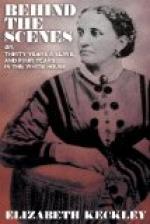on the plantation who claimed to be called to do service
for God, by teaching their fellow men the principles
of religion. God certainly must have revealed
himself to these poor souls, for they were very ignorant—they
did not know a letter of the Bible. But when they
opened their mouths they were filled, and the plan
of Salvation was explained in a way that all could
receive it. It was always a mystery to the white
brethren how the slaves could line out hymns, preach
Christ and redemption, yet have no knowledge even
of how the name of Christ was spelled. They were
illiterate to the last degree, so there is but one
theory, they were inspired. God revealed unto
them just what they should teach their flock, the
same as he did to Moses. I remember very well
that there was always a solemnity about the services—a
certain harmony, which had a peculiar effect—a
certain pathetic tone which quickened the emotions
as they sang those old plantation hymns. It mattered
not what their troubles had been during the week—how
much they had been lashed, the prayer-meeting on Saturday
evening never failed to be held. Their faith
was tried and true. On Sunday afternoons, they
would all congregate again to praise God, and the
congregation was enthusiastic. It was pathetic
to hear them pray, from the depths of their hearts,
for them who “despitefully used them and persecuted
them.” This injunction of our Saviour was
strictly adhered to. The words that came from
the minister were always of a consolatory kind.
He knew the crosses of his fellow slaves and their
hardships, for he had shared them himself. I was
always touched in hearing him give out the hymns.
I can hear old Uncle Ben now, as he solemnly worded
out the following lines:
Must I be carried to
the skies,
On flowery
beds of ease,
While others fought
to win the prize,
And sailed
through bloody seas?
After singing he would always speak to them of the
necessity for patience in bearing the crosses, urging
them to endure “as good soldiers.”
Many tears were shed, and many glad shouts of praise
would burst forth during the sermon. A hymn usually
followed the sermon, then all retired. Their
faces seemed to shine with a happy light—their
very countenance showed that their souls had been
refreshed and that it had been “good for them
to be there.” These meetings were the joy
and comfort of the slaves, and even those who did
not profess Christianity were calm and thoughtful
while in attendance.
* * * *
*
A NEIGHBORHOOD QUARREL




